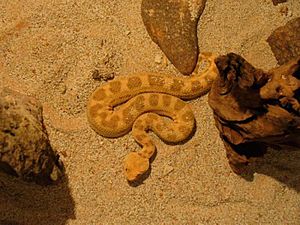Cerastes facts for kids
Quick facts for kids Cerastes |
|
|---|---|
 |
|
| A Desert Horned Viper, Cerastes cerastes | |
| Scientific classification | |
| Kingdom: | |
| Phylum: | |
| Subphylum: | |
| Class: | |
| Order: | |
| Suborder: | |
| Family: | |
| Subfamily: | |
| Genus: |
Cerastes
|
Cerastes is a group of small, venomous snakes. They are a type of viper. These snakes usually grow to about 50 centimeters long. There are three different kinds of Cerastes snakes. People often call them "Horned Vipers." They are also known as "North African Desert Vipers" or "Cerastes Vipers."
Contents
Horned Viper Behavior
Horned Vipers are nocturnal. This means they are active mostly at night. During the day, they often hide. They live on the ground, so they are called terrestrial animals. You can usually find them buried under the sand.
Moving Around
These vipers are usually slow movers. However, they have a special way of moving called "sidewinding." When they sidewind, they can move much faster across the sand. This helps them travel quickly in their desert home.
Hiding in the Sand
Horned Vipers are very good at hiding. They can sink into the sand with a rocking motion. They start by burying their tail first. Then, they keep sinking deeper into the sand. Soon, only their eyes and nose are sticking out. They do this to surprise their prey. When an animal comes close, the viper can quickly strike!
Reproduction
Cerastes vipers are oviparous. This means they lay eggs. Many snakes give birth to live young, but these vipers lay eggs. They live in the deserts of North Africa, Arabia, and Iran.
What Horned Vipers Eat
Horned Vipers catch their food by ambushing. This means they wait hidden for their prey to come near. Once an animal is close enough, they quickly attack. They mainly eat small animals. Their diet includes rodents, birds, and lizards.
Types of Horned Vipers
There are three main types of Cerastes vipers:
- Desert Horned Viper, known as C. Cerastes
- Arabian Horned Viper, known as C. Gasperettii
- Sahara Sand Viper, known as C. Vipera
 | Calvin Brent |
 | Walter T. Bailey |
 | Martha Cassell Thompson |
 | Alberta Jeannette Cassell |

